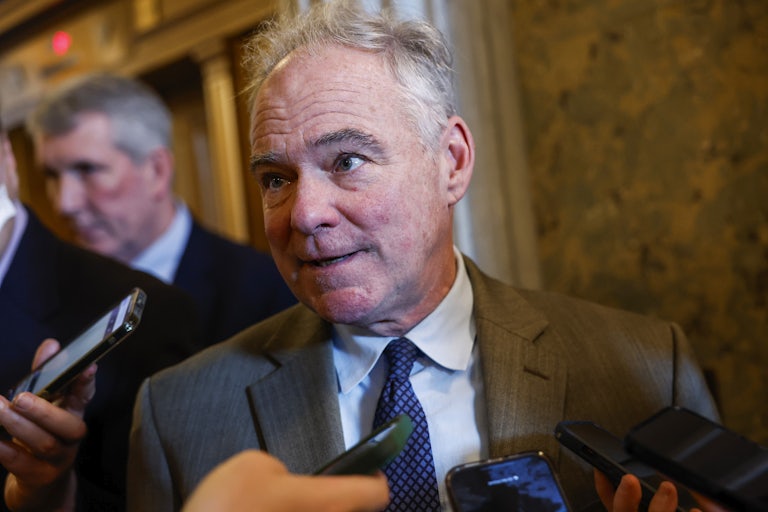Grace Segers

It’s been a few days since three U.S. service members were killed in a drone strike by an Iran-backed militia in Jordan. President JOE BIDEN has said that the U.S. “shall respond” but has not given details about what that response will be. Given the various ongoing conflicts in the Middle East—including Israel’s war against Hamas in Gaza, and recent U.S. airstrikes against Houthis in response to their disrupting traffic in the Red Sea—reporter GRACE SEGERS wonders whether lawmakers are concerned that the U.S. might become embroiled in yet another “forever war” in the Middle East. She questions senators across the ideological spectrum about this possibility.
Enter Senator TIM KAINE, a Democrat from Virginia who has co-sponsored legislation to repeal the 1991 and 2002 Authorizations for the Use of Military Force in Iraq.
KAINE: We shouldn’t be in another war in the Middle East, but particularly without a congressional debate and vote. So self-defense is one thing, but escalating regional conflict with the U.S. involved and our troops at risk is something that should not happen without a congressional debate and vote.
Camera pans to the Senate basement. Grace asks Senator MIKE ROUNDS, a Republican from South Dakota, if he’s worried about the U.S. getting entangled in a larger conflict in the United States.
ROUNDS: Sure, everybody should be. If we continue down this policy of not dealing with the problem children in the Middle East, yes. It started with a very, very poor policy with regard to Afghanistan, and now it’s continued on … where if you don’t deal with these individuals that are causing the problem up front, then they just continue to test the waters.
GRACE: Isn’t there the threat that if you go down that route of responding, that then it could end up in a tit-for-tat?
ROUNDS: We know what happens when you’re in a tit-for-tat, which is what we’re in right now. Where all we do is, just kind of push them a little bit, and then they go, “Oh, that wasn’t so bad.” So then they push back, and now they’re killing Americans. Bottom line is, they have to fear us, and they have to respect our military.
Back outside of the Senate chamber, we turn to Senator JOSH HAWLEY, a Republican from Missouri who has been skeptical of U.S. involvement in foreign conflicts.
HAWLEY: We’ve got to find a way to isolate Iran, to cut off any kind of support from the international community, to return to something like we had in the previous administration, where they really were truly isolated. Their revenues were way down. I mean, that’s got to be our goal while we continue our pivot toward the Pacific, where our biggest enemy is in China, where our biggest national security threats are.
GRACE: I think everyone wants to avoid another type of “forever war,” but do you feel as if there are steps that could be taken where the U.S. could go in that direction again?
HAWLEY: I’m leery of anything that would get us more involved in the Mideast in terms of central command—the central command area of authority—in terms of more manpower, more hardware. We have finite resources, and we have threats all over the world, but we have to prioritize.… Do I want to do nothing with Iran? No, I think we need to retaliate. We certainly need to isolate them. But I think we want to be careful that we don’t find ourselves embroiled, we don’t take actions that can embroil us in a major military conflict.
INT. U.S. CAPITOL—IN THE SENATE BASEMENT ON JANUARY 31, 2024 Enter Senator CHRIS COONS, Democrat from Delaware, a close ally of Biden.
GRACE: I’m wondering if you’re concerned at all—
COONS: “Wondering if you’re concerned.” Oh, my. That’s quite a way to frame it.
GRACE: Sure.
COONS: Let’s try again.
GRACE: How do you feel about the possibility that what’s happening in the Middle East could escalate into another type of “Forever War” that the U.S. could be embroiled in?
COONS: (Laughs, shakes head) Well, that’s about as negative a way as you could possibly characterize it. “Are you concerned about another Forever War?” I mean the answer to any formulation like that is going to be, “Of course I’m concerned.” Let’s put it differently: How confident am I that President Biden is clear eyed about the risks in the Middle East and is taking measured, responsible steps to both deter aggression and defend our troops and yet avoid a regional conflagration? Highly confident.
One of the great things about having a president with 50 years of experience in foreign policy is, he’s very, very aware of the difficulties, the tension, the competition in the region; the differences between the Houthis, Hezbollah, Hamas; the different militias in Syria and Iraq; and the overarching role that Iran is playing. But I’m confident that he is carefully balancing how to deter Iran, how to strike back in a way that shows a firmness and determination to protect American troops, with an eye towards avoiding broadening the conflict.
Camera pans to GRACE, who looks directly into the lens as she offers the following analysis.
GRACE: It’s still unclear to what extent the U.S. will become further engaged in conflicts in the Middle East in the coming weeks. While senators agree that Iranian-backed aggression should not go unheeded, the correct path for de-escalation is uncertain. While the prospects of another “forever war”—à la Afghanistan or Vietnam—are unappealing, time will tell whether the current conflict will evolve into a full-blown sequel.
No comments:
Post a Comment